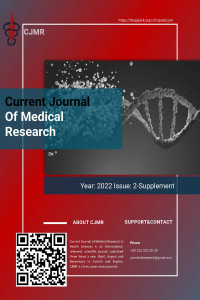Gebelerin Antenatal Genetik Tarama Testleri Hakkındaki Bilgi Düzeylerinin ve Uygulamalarının Araştırılması
Öz
Amaç: Bu çalışmanın amacı gebe kadınların doğum öncesinde yapılan genetik tarama testleri (TT) hakkındaki bilgi düzeyleri ve tutumlarını belirlemektir.
Gereç ve Yöntemler: Çalışmamız 01.01.2022-01.06.2022 tarihleri arasında yapıldı. Çalışma grubu İKÇÜ Atatürk Eğitim ve Araştırma Hastanesi gebe polikliniğine başvuran 12. gebelik haftasını tamamlamış 300 gebeden oluşmaktadır. Kontrol grubu bulunmamaktadır. Çalışma, hastanenin gebe polikliniğine rutin gebelik kontrolü için başvuran gebelerle yüz yüze yapılmış bir anket çalışmasıdır. Her bir gönüllüye demografik özelliklerini belirleyen 9, antenatal TT’leri hakkındaki bilgi düzeylerini ve tutumlarını belirleyen 19 adet anket sorusu yöneltildi. Anket sonuçları IBM SPSS istatistik programı kullanılarak oluşturuldu.
Bulgular: Ankete katılım gösteren gebelerin %82’si TT (2’li ve/veya 3’lü TT) yaptırmıştı. Gebelerin %62'sinin TT yaptırma amacı bebekte Down sendromu ve diğer kromozom anomalilerinin riskine bakmak idi. Gebelerin %67’si için test sonucunun riskli çıkmasının bebeğin kesin özürlü olduğu anlamına gelmediği, %60 gebe için test sonucunun riskli çıkmamasının bebeğin kesin sağlıklı olduğu anlamına gelmediği öğrenildi. TT yaptırmayanların %31.5’i test sonucunun gebelik seyrini etkilemeyeceği için yaptırmamıştı. Katılımcıların %30.3'ü TT riskli çıkarsa ileri araştırma (invaziv tanı) yaptırmak istediğini, %75’i ise bebeğinin Down sendromu tanısı alması durumunda gebeliğine devam etmek istediğini belirtti. Okur-yazar olmayan ve ilkokul mezunlarında, sosyal güvencesi olmayanlarda, akraba evliliği olanlarda TT yaptırmadan önce bilgi sahibi olma ve TT yaptırma anlamlı olarak daha az bulundu. Üniversite mezunlarında, çalışanlarda, akraba evliliği olmayanlarda TT yaptırmadan önce bilgi sahibi olma anlamlı olarak daha fazla bulundu. TT öncesi bilgisi olanlarda, TT yaptırma oranı anlamlı olarak daha fazla bulundu.
Sonuç: Hastalarımızın çoğunluğu TT’ni biliyordu (%90.7) ve büyük çoğunluğu yaptırmıştı (%82). TT sonucunun yorumlanması ile ilgili eksik veya yanlışbilgilerin giderilmesi için ilk antenatal vizitte doktor ve hemşire tarafından hasta bilgilendirilmelidir. Özellikle eğitim düzeyi düşük, okuma yazması olmayan ve sosyal güvencesi olmayan gebelerde bilgilendirme önemlidir. Çalışmamızın sonuçları gebelerin TT hakkındaki tutumlarını olumsuz etkileyen noktaları tespit edilmesine ve çözüm konusunda yeni stratejiler geliştirilmesine yardımcı olabilir.
Anahtar Kelimeler
Examination of the Knowledge, Attitude, and Behaviours of Pregnant Women on Antenatal Genetic Screening Tests
Öz
Objective: The present study aimed to examine the knowledge, attitudes, and behaviors of pregnant women about antenatal genetic screening tests (STs).
Materials and Methods: The study was conducted between 01.01.2022 and 01.06.2022. The study group consisted of 300 pregnant women who completed their 12th gestational week and applied to the IKCU Ataturk Training and Research Hospital pregnant outpatient clinic. There was no control group. The study is a face-to-face survey study conducted with pregnant women who applied to the hospital's pregnancy outpatient clinic for routine antenatal control. Each volunteer was asked 9 questions that determined their demographic characteristics and 19 questions that determined their knowledge level and attitudes about antenatal genetic STs. Survey results were created using the IBM SPSS statistical program.
Results: 82% of the pregnant women who participated in the survey had performed STs (Serum Combined Test and/or Triple Test). Of the 62% of the pregnant women, the reason for performing a ST was to check the risk of Down syndrome and other chromosomal anomalies for the baby. For 67% of the women, a positive screen test result did not mean that the baby was precisely disabled, and for 60% of the women, a negative screen test result did not mean that the baby was precisely healthy. 31.5% of the women did not perform a ST as the result of the test would not affect their decision about the course of pregnancy. 30.3% of the participants stated that they would like to perform further research (invasive diagnosis) if they had a positive ST and 75% stated that they wanted to continue their pregnancy if their baby was diagnosed with Down syndrome. Being informed before performing a ST and having performed a ST were significantly less in illiterate and primary school graduates, those without health insurance, and those having consanguineous marriages. Pregnant women who graduated from university, had a job and do not have consanguineous marriage significantly have more knowledge before performing a ST. The rate of having a ST was found to be significantly higher in women who know about performing a ST.
Conclusion: The majority of our patients knew STs (90.7%) and the vast majority (82%) had performed a ST. We thought that to eliminate missing or incorrect information about the interpretation of the ST results, all pregnant women should be informed by the doctor and nurse at their first antenatal visit. It is especially important to inform pregnant women with low education levels, women that are illiterate and those who do not have health insurance. The results of our study may help to identify the points that negatively affect the attitudes of pregnant women about STs and to develop new strategies for making solutions.
Anahtar Kelimeler
Ayrıntılar
| Birincil Dil | Türkçe |
|---|---|
| Konular | Klinik Tıp Bilimleri |
| Bölüm | Konferans Bildirisi |
| Yazarlar | |
| Yayımlanma Tarihi | 6 Aralık 2022 |
| Gönderilme Tarihi | 9 Haziran 2022 |
| Yayımlandığı Sayı | Yıl 2022 Cilt: 2 Sayı: 2-Supplement |

